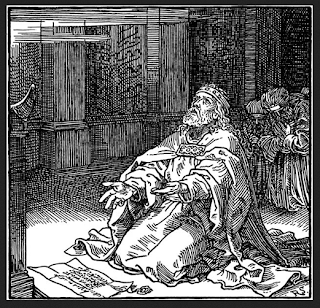TO CHEW ON: "And Hezekiah received the letter from the hand of the messengers, and read it, and Hezekiah went up to the house of the Lord, and spread it before the Lord." 2 Kings 19:14
Today's reading is only part of a larger story where Sennarcherib king of Assyria has threatened Hezekiah, king of Judah, numerous times.
- Hezekiah responded to the first threat by asking the Assyrian envoys to stop speaking the language the people could understand - 2 Kings 18:26.
- He responded to the second threat with silence and later called on Isaiah to pray - 2 Kings 18:16-37; 19:2-4.
- Today's reading is Assyria's third challenge. Walter Brueggemann says of this time:
"... it is important to understand the context of acute anxiety in which the king prays. Hezekiah utters his prayer because he is completely vulnerable and has exhausted all other resources" - Walter Brueggemann, Great Prayers of the Old Testament, p. 82 (emphasis added).
So Hezekiah goes to the temple in Jerusalem with the threatening Assyrian letter in hand, spreads it out before God and prays.
What a picture of "Help!" Perhaps this is what we should do more of when we get puzzling correspondence, bills that are bigger than the extra in our bank accounts, a bad report about our child from the teacher, distressing news about our neighbourhood or country in the newspaper. We too could spread these things out before God and cry out for His help.
As the writer of my Bible's notes says, "Hezekiah is an excellent illustration of what a believer should do when threatened by an enemy. Hezekiah does not react to the threats of Sennarcherib, but cries out to the Lord for help" - Larry D. Powers, Notes on 2 Kings, New Spirit-Filled Life Bible, p. 507 (emphasis added).
PRAYER: Dear God, please bring to my mind this picture of Hezekiah the next time I feel threatened. May I make it a habit to call on You in trouble before I do anything else. Amen.
PSALM TO PRAY: Psalm 106
MORE: A great OT prayer
Hezekiah's prayer here is considered another of the great prayers of the Old Testament. Our commenter on these prayers takes this lesson for us from Hezekiah's actions and words:
"In the midst of a frightened people and in the face of overwhelming imperial power, Hezekiah nevertheless acts and speaks as a person of faith who appeals to a will and an agency that refuses conventional worldly characterizations of power .... The most important promise of this text is that prayer cannot be confined to safe familial or domestic spheres of life. The most important seduction of this text is the temptation to harness 'the power of prayer' to the cause of state in uncritical ways" - Walter Brueggemann, Op. Cit. , pp. 86,87 (emphasis added).

No comments:
Post a Comment